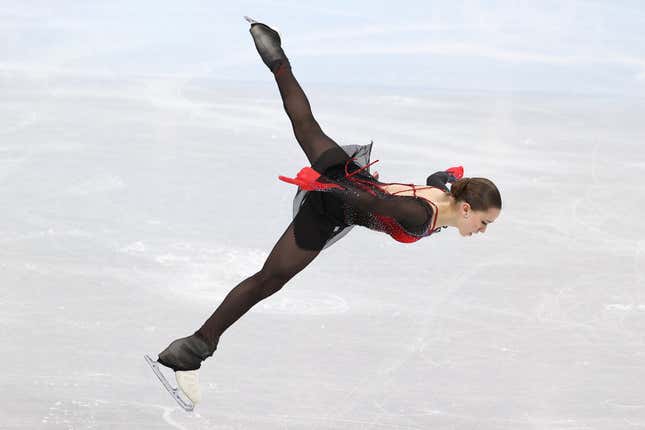
Only seven years after a comprehensive Russian state-sponsored doping program was discovered, and two years after Russia was consequently sanctioned by the World Anti-Doping Agency, the Russian Olympic Committee’s 15-year-old star skater Kamila Valieva has tested positive for a banned substance, postponing the team figure skating medal ceremony at the Beijing Olympics.
The IOC and the Olympics have a history of overlooking transgressions large and small for the sake of keeping the Games going and the big competitors in play, so while Russia is technically banned from competing in international sporting events, it’s a ban in name only. Putin was still at the Opening Ceremonies, Russian athletes have continued to compete under the “Russian Olympic Committee” name, and the ban was even shortened from four to two years in an appeal. The only real ban in place is any portrayal of the Russian flag or national anthem — so essentially, nothing changed.
And (shocker) here we find ourselves again in the midst of yet another Russian doping scandal — nothing new, as these allegations go back to the Soviet Era, and have affected nearly every Olympic Games since Beijing 2008. Russian newspapers are reporting that Valieva was found with Trimetazidine in her system, a drug used to treat angina that was added to the WADA’s banned substances list in 2014 as it can aid in endurance and increase blood flow.
Several athletes have been sentenced to short competition bans after positive tests for trimetazidine in different sports, but Valieva’s case may be different. Not yet 16 years old, she is considered a “protected person,” which could lessen a possible punishment by absolving her of accountability, as she may not have known what she was taking, per ESPN.
The outcome of the ongoing investigation will determine not only if Russia — pardon me, the Russian Olympic Committee — will get to maintain their gold in the team competition, but also whether Valieva will be allowed to compete in the individual figure skating events, in which she is expected to win gold. The positive test was obtained before the Games began, according to the Associated Press. Valieva appeared at her regularly scheduled practice time on the ice earlier today.
This Olympics has already suffered its fair share of bad press and low ratings. From China’s manmade snow and cringeworthy catering to NBC’s coverage of Mikaela Shiffrin’s DNF, from the general lack of interest and meaningless diplomatic boycotts to the disappearance of Peng Shuai — not to mention that dreary photo of the ski jump surrounded by concrete silos — yet another Russian doping scandal is the last thing the Olympics need right now, and yet totally unsurprising.
As the IOC continues to operate under the pretense that politics and world affairs have no effect on the pure, unblemished Olympic Games, that facade is far past cracking — it’s crumbling before our very eyes as Thomas Bach wilfully overlooks every possible red flag waving before him. Of course Russia is involved in a doping scandal again — did you really think that telling them they couldn’t play their national anthem would change anything about how their international teams have been operating for the past decade?